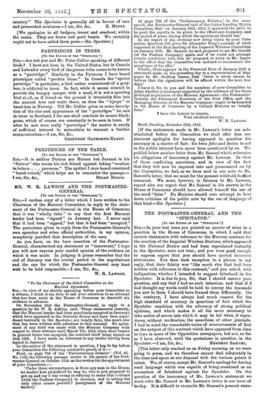MR W. R. LAWSON AND THE POSTMASTER- GENERAL.
[To THE EDITOR OF THE "SPECTATOR:9 SIR,—I enclose copy of a letter which I have written to the Chairman of the Marconi Committee in reply to the state- ment of the Postmaster-General in the House of Commons that it was "wholly false" to say that the first Marconi tender had been "signed" in January last. I never said that it had been "signed," but that it had been "accepted." The quotations given in reply from the Postmaster-General's own speeches and other official authorities, in my opinion, completely justified that description of the case.
As you have, on the bare assertion of the Postmaster. General, characterized my statement as "inaccurate," I hope you will now express your candid opinion of the evidence on which it was made. In judging it please remember that the end of January was the crucial period in the negotiations and the one for which the Postmaster-General may least wish to be held responsible.—I am, Sir, &c., W. R. LewsoN.
"To the Chairman of the Select Committee on The Marconi Agreement.
SIR,—In view of my shortly appearing before your Committee as a witness, I think it my duty to call your attention to an attempt that has been made in the House of Commons to discredit my evidence in advance.
On November 21st the Postmaster-General, in reply to a question by Sir W. R. Adkins, said, 'These statements (namely, that the Marconi tender had been practically accepted in January) which have appeared in the National Review and have been repro- duced textually in the Spectator, are totally false, like much else that has been written with reference to this contract. No agree- ment of any kind was made with the Marconi Company with respect to these stations until March 7th, 1912, when their tender in general terms was accepted, the contract itself being signed on July 19th. I have made no reference to any tender having been signed in January.' As the author of the statement in question, I beg to lay before your Committee the following conclusive proofs of it :- First, on page 744 of the Parliamentary Debates' (Vol. 42, No. 119) the following passage occurs in the speech of the Post- master-General on October 11th on the motion for the appointment of your Committee :— 'Under these circumstances, is there any man in the House, no matter how prejudiced he may be, who is now prepared to get up and say I was wrong in refusing to make that contract (with the Poulsen Company) in January, and in taking the only other course possible? (acceptance of the Marconi tender): At page 723 of the 'Parliamentary Debates,' in the same speech, the Postmaster-General said of the Cables Landing Rights Committee, that on January 24th, 1912, it approved the price to be paid, the royalty to be given to the (Marconi) Company, and the period of years during which the agreement should run.' In the report of the evidence now being taken by your Com- mittee, Question 556 gives Sir Alexander King's account of what happened at the final meeting of the Imperial Wireless Committee on January 17th. Mr. Samuel, he said, proposed to see Mr. Gandil (of the Poulson Company) again, and if he could not arrange certain conditions with him he proposed to write to Mr. Isaacs to the effect that the Committee was inclined to recommend the acceptance of his offer.' Finally, there appears in the Financial News of January 25th a statement made on the preceding day to a representative of that paper by Mr. Godfrey Isaacs, that 'there is every reason to believe that the signatures will be affixed within the next few days.' I leave it, Sir, to you and the members of your Committee to judge whether a statement supported by the evidence of the three principal negotiators of the Marconi Agreement—the Postmaster- General, the Permanent Secretary of the Post Office, and the Managing Director of the Marconi Company—ought to be branded in the House of Commons by a Cabinet Minister as totally
have the honour to remain, Your obedient servant, North Pinchley, November 251h, 1912.
W. R. LAWSON.
[If the statements made in Mr. Lawson's letter are sub- stantiated before the Committee we shall offer him our sincerest apologies for having appeared to question his accuracy in a matter of fact : his bona fides and desire to act in the public interest have never been questioned by us. We publish below another letter from Mr. Samuel which reiterates his allegations of inaccuracy against Mr. Lawson. In view of these conflicting assertions, and in view of the fact that they will now be inquired into and pronounced on by the Committee, we feel, as we have said in our note to Mr. Samuel's letter, that we must for the present withhold fin ther comment. We must, however, in fairness to Mr. Lawson, repeat also our regret that Mr. Samuel in his answer in the House of Commons should have allowed himself the use of the word "false." No Minister should ever attempt to beat down criticism of his public acts by the use of language of that kind.—En. Spectator.]


















































 Previous page
Previous page